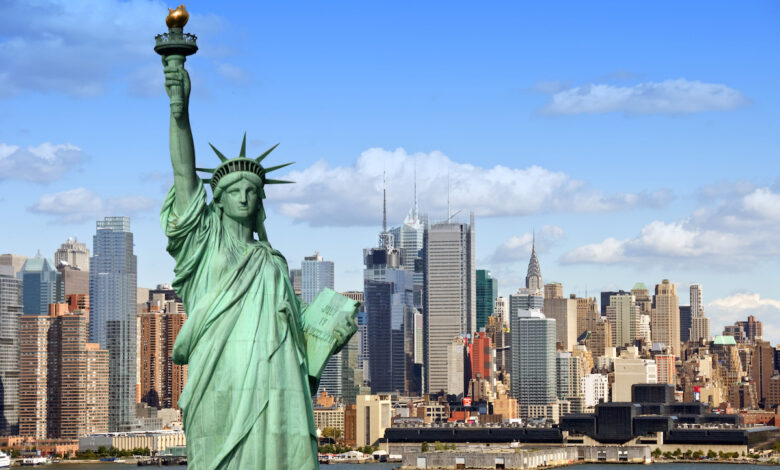The City That Never Sleeps Dreams of Being Silicon Valley

New York City, the concrete jungle where dreams are made, is now dreaming of a new kind of dominance: artificial intelligence.
The metropolis, long known for its towering skyscrapers and fast-paced financial district, is setting its sights on becoming the next Silicon Valley, according to a report by Accenture and interviews with business leaders and AI experts.
From the bustling streets of Manhattan to the hipster havens of Brooklyn, the city is abuzz with talk of AI. Companies are funneling resources into AI while the city’s professionals seek to capitalize on this emerging technology’s potential.
As the business community rallies around AI with the same energy as a subway performer’s captive audience, industry insiders predict that New York could soon give San Francisco and Seattle a run for their money as the go-to destination for cutting-edge technology. With industries from finance to healthcare on the brink of an AI revolution, the city that never sleeps may soon earn a new nickname: the city that never stops innovating.
“If New York learns how to attract engineering AI talent faster than the Bay Area and retain that talent more effectively, then communities will be formed where engineers and entrepreneurs passionate about AI can interact, share ideas, learn from each other and drive innovation forward, Egor Olteanu, co-founder and CEO at Volt AI, told PYMNTS. “Silicon Valley is a beautiful place between an ocean and mountains with near-perfect California weather — what is New York willing to do to attract talent and keep them there instead?”
Gov. Kathy Hochul has unveiled ambitious plans to make New York the national leader in AI research and innovation. She has created a $400 million fund to attract AI development to the state by establishing a consortium of seven top New York higher-education institutions.
As the AI industry experiences explosive growth, states nationwide are scrambling to attract AI businesses and talent, offering enticing incentives. From tax breaks and grants to investments in cutting-edge research facilities, state governments are pulling out all the stops to create the most appealing environments for AI companies to flourish.
In this high-stakes competition, some states are using their existing advantages to gain an edge. California and Massachusetts, for example, are capitalizing on their well-established tech ecosystems and world-class universities to position themselves as premier AI hubs. Meanwhile, other states like Texas and Florida are emphasizing their business-friendly policies and lower costs of living to lure AI professionals and startups away from the coasts.
Bright Lights, Big AI
According to Accenture, putting people first in NYC’s generative AI push could mean a $320 billion boost for the state by 2038. The city’s industry diversity, top talent, academic prowess and surging tech scene make it ripe for AI breakthroughs.
The report suggested six key actions to solidify the city’s position as a global AI destination: preparing local talent; providing responsible AI; promoting continuous reinvention; powering the city’s digital core; propelling AI infrastructure; and positioning leaders as catalysts for AI enablement.
“Today, the city is already home to over 40,000 AI professionals and, according to Accenture analysis, it is second in the nation for venture capital investment in AI,” the report’s authors wrote. “Since 2019, over 1,000 (1,035) AI-related companies in the city have raised $27 billion in funding, tied with Beijing, and ahead of AI centers like Shanghai ($15 billion), London ($11 billion), Tel Aviv ($7 billion) and Singapore ($4 billion).”
Politicians are eager to capitalize on the economic potential of an AI boom. Hochul announced in January the launch of Empire AI, an initiative to position the state as a leader in AI research. As part of the fiscal year 2025 Enacted Budget, the state will invest hundreds of millions of dollars to establish a state-of-the-art AI computing center at the University at Buffalo. The center, supported by leading New York institutions, will focus on responsible AI research and development, job creation, and advancing AI for public benefit.
“Whoever dominates the AI industry will dominate the next chapter of history, and we want New York to win the race for the future,” Hochul said in an April news release. “Our Empire AI Consortium will position New York state at the forefront of this burgeoning industry for decades to come. Through this pioneering public-private partnership, we are fostering an ecosystem of innovation, research and growth that will drive countless new discoveries, launch new companies and products, and transform the way that New Yorkers live their lives for the better.”
Major AI Players in the Big Apple
New York City has become a hub for large corporations with dedicated AI research teams. IBM Research, headquartered just outside the city, has been the birthplace of numerous AI and semiconductor technology breakthroughs. Meanwhile, tech giants like Amazon, Google, Notion, and Meta have established a strong presence in New York, staffed with well-known AI research talent.
Smaller AI companies are also heading to New York. In February, OpenAI reportedly planned to lease approximately 60,000 square feet of office space in the city. Similarly, OpenAI’s competitor Cohere revealed in March that it would expand its footprint in New York.
Victor Oribamise, CEO of Kquika, a New York City-based company that develops AI solutions for the aviation and aerospace industries, told PYMNTS that New York is quickly becoming one of the world’s most important centers for AI innovation, thanks to the state’s strengths in key industries like finance, aviation, healthcare and media.
“New York is rapidly staking its claim as one of the world’s leading AI hubs,” he said, adding that the state provides “an ideal place to incubate AI innovation that can transform major industries.”
Oribamise also highlighted some of the state’s most significant AI initiatives, such as the research being conducted by New York University’s AI Now Institute on the societal implications of AI and the strong AI research presence of major corporations like IBM, Google, and Meta.
“New York’s talented workforce pipeline from schools like NYU, Columbia and Cornell is also attracting capital and top AI startups like Kquika, Anthropic, Clarifai and DataRobot,” he said.
Oribamise suggested that clustering AI talent in New York could transform the entire industry.
“Concentrating this level of AI firepower in New York has the potential to reshape the entire industry’s landscape,” he said.
By connecting technical expertise with domain knowledge from the major industries based in New York, he said he believes we could see “breakthroughs in applying AI to revolutionize fields like aviation/aerospace (like what the Kquika team is focusing on), medicine, finance, media and more.”
The density of top AI talent in New York could rival that of Silicon Valley, potentially leading to decentralization and increased competition within the field, according to Oribamise.
“At this point, it’s clear New York’s AI moment has arrived,” he said. “The resources being invested and cross-disciplinary collaborations happening here position our state to play a defining role in AI’s future trajectory and impacts across society.”
Not everyone thinks New York is embracing AI as fast as possible. Nathaniel Powell, CEO and founder of Deep Market Making, an AI credit trading firm in New York, told PYMNTS that the financial industry in the city has been slower to invest in deep learning compared to the technology industry in Silicon Valley.
“When I moved from the technology industry in Seattle to the financial industry in New York, J.P. Morgan Chase, and now Deep Market Making, I was appalled at how little investment was going into deep learning for finance compared to what I was used to at Microsoft,” Powell said.
Powell said he believes that concentrating AI in New York could profoundly impact the industry. It could shift the focus toward models that are more useful for financial services and other B2B uses, such as financial time series models and event-driven deep learning, which Deep Market Making specializes in.
“It would probably take the spotlight away to some degree from the current large language model focus we’re seeing now,” Powell added.
AI Future of New York?
According to a McKinsey report, generative AI could help address critical challenges in the New York region’s labor market, such as worker shortages and stagnating productivity. However, the technology is also expected to change the mix of jobs in the area by 2030, requiring up to 1.1 million occupational shifts.
While generative AI has the potential to create a net gain of 700,000 jobs and push people toward higher-value roles, minimizing its negative impact on workers will require coordinated efforts from public, private and education sector leaders.
“In conjunction with many other forces driving change from Suffolk to Bergen County, gen AI has the potential to shift the nature of occupations for bankers on Wall Street and creatives in Williamsburg, creating new jobs we cannot even imagine yet, and altering the mix of jobs in the country’s biggest labor market,” the report concluded.
While Silicon Valley has been known as the hub for technological advancements for decades, New York offers some significant advantages, Olivia Martinez Goetz, head of communications at Mission Cloud, a generative AI and cloud services provider that has a New York office, told PYMNTS.
“The city’s diverse industries, including finance, healthcare, media and retail, create a fertile ground for AI applications,” Goetz said. “New York’s access to top-tier academic institutions contributes to a rich talent pool and a thriving startup ecosystem.”
New York’s diverse economy means AI innovations will span industries, from finance and healthcare to media and retail, leading to a broader range of AI applications and solutions, Goetz said.
She added that “the growth of the AI sector in New York will contribute significantly to the local economy, creating jobs and attracting investments.”
For all PYMNTS AI coverage, subscribe to the daily AI Newsletter.



